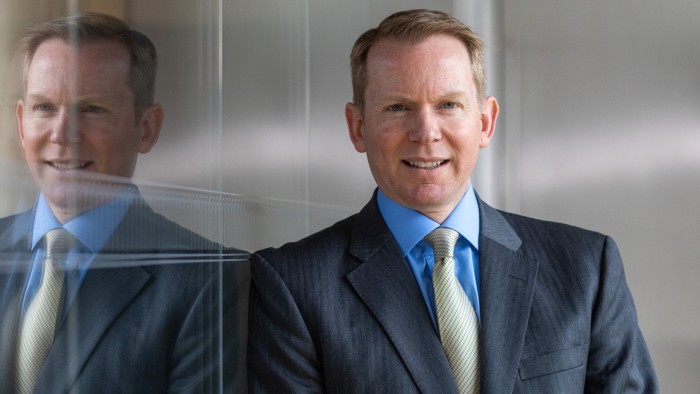Stay informed with free updates
Simply sign up to the UK banks myFT Digest — delivered directly to your inbox.
The boss of Lloyds Banking Group has likened forcing pension funds to invest in UK assets to “capital controls”, arguing that tackling the housing crisis and improving Britons’ financial resilience would be a better way to grow the economy.
Charlie Nunn said mandation would put funds “in conflict” with their fiduciary legal obligations to find the best returns for pensioners.
“Mandating allocations of pension funds is a form of capital control. I have spent 10 years of my working life in China and many jurisdictions where there are capital controls,” he told the Financial Times. “That is a different model and that is a difficult slope for an economy that believes it is an open economy.”
The comments from the chief executive of Lloyds, the UK’s largest retail bank and owner of pension provider Scottish Widows, come days ahead of chancellor Rachel Reeves’ Mansion House speech, which will include a strategy for the financial services industry.
The government has already said it would create a “backstop” power to force pension funds to invest in British assets, such as infrastructure, housing and fast-growing businesses, alongside voluntary agreements with the sector. There is also a debate over whether requiring set levels of investment into UK equities would help address the decline in backing by domestic institutions of British listed companies.
Lloyds already has £35bn allocated towards investing in British assets, noted Nunn.
An expected announcement by Reeves of a cut to the annual tax-free cash Isa allowance was just a small part of the battle in fixing the UK’s financial health, Nunn added.
“Everyone gets tied up in the cash Isa debate . . . which is relevant for a few rich people if we are honest about it. But that’s not where the problem is, that’s not the way to turn around the economy”, he said.
Cutting the cash Isa allowance would be designed to encourage more savers into equities amid hopes it will help revive the fortunes of the London Stock Exchange. But Nunn said a lack of financial advice was also preventing people from saving more efficiently, with about 70 per cent of Brits having less than £5,000 in savings.
The Labour government’s retreat this week on welfare reforms stoked fears that the chancellor will ultimately have to increase taxes to plug the £5bn hole in the public finances.
There is also unease in the City that the chancellor could boost the Treasury coffers by increasing the bank levy — one option included on a leaked memo by deputy prime minister Angela Rayner earlier this year.
Nunn said there have been “no discussions on that” with the government. But he stressed that any increase the corporation tax rate for banks would “slow down my ability to lend to real customers and support business and growth”.
The Lloyds boss highlighted that Britain was facing a “housing crisis that has been forty years in the making”, particularly for affordable homes with 1.5mn fewer homes available on social rents than in the 1980s.
Ahead of a social housing forum organised by Lloyds on Monday, Nunn said co-ordination between lenders, developers, local councils and government was essential to solve the issue.
The bank, which has lent more than £20bn to the social housing sector, plans to turn one of its older data centres in Pudsey, West Yorkshire into 124 affordable homes.
Lloyds has set itself a target of supporting 1mn homes at socially affordable rents over the next decade. “I always believe if you’re not ambitious about targets it’s never going to happen,” Nunn says.
Despite lofty targets — with the government also pledging to build 1.5mn homes in England in the five years to 2029 — the number of homes built last year went backwards, Nunn acknowledged. Private firms are reluctant to lose money on development by building into a downturn, while cash-strapped local councils are spending more retrofits for sustainability, as well as safety issues caused by cladding, than building homes.
Nunn called housing a “critical need” for the UK’s growth ambitions: “Because this will drive growth in communities, productivity, it’s very important as a foundation for the UK.”
“We need to do more and we need to do it faster. These are massive issues for people in the UK and they aren’t being resolved quickly enough,” he said.
Nunn said Lloyds took a “glass half full” approach to the economy, although the bank only expects growth of about 1 to 1.5 per cent a year in the next three years.
“The economy is healthier . . . The issue is we don’t have the confidence and the vision to invest and we are not getting businesses investing in that next stage of growth.”
https://www.ft.com/content/1933035e-cf36-4372-bbf1-c237acc225f5


